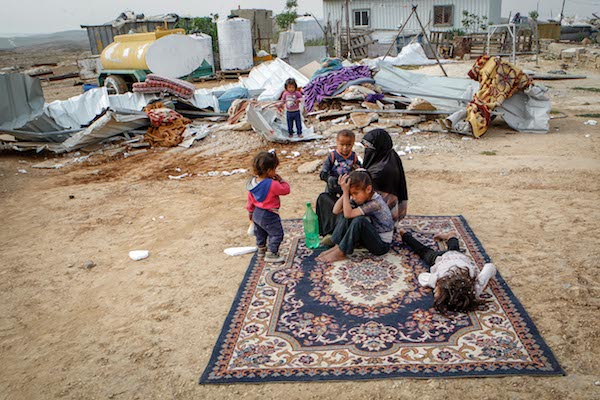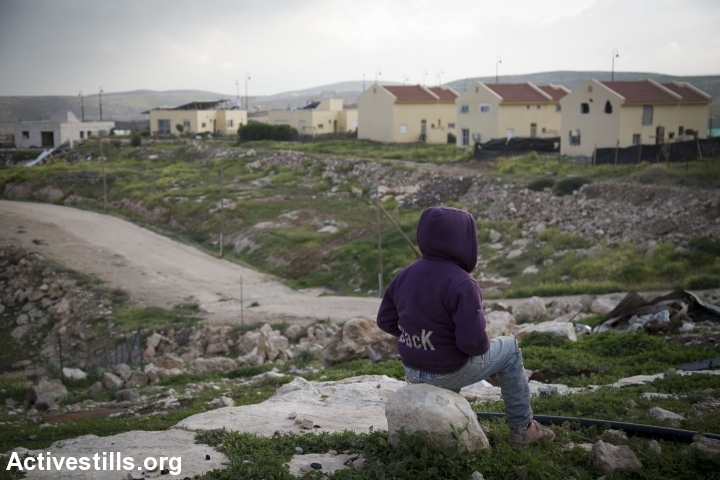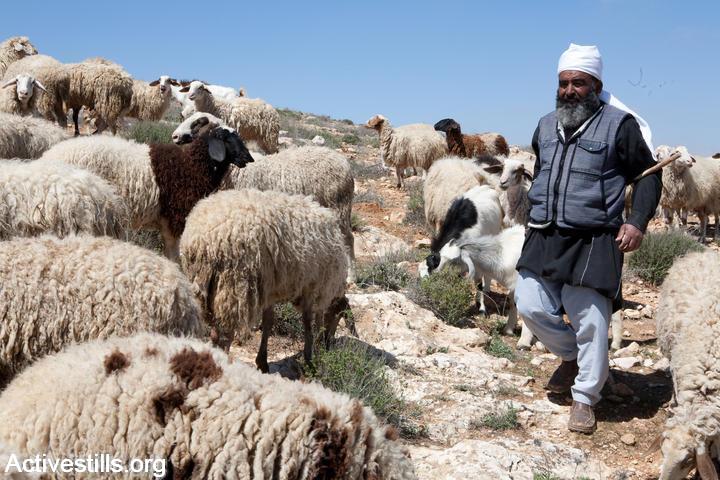The residents of Umm al-Khair have been robbed of humanity and justice. We have the right to live without the constant threat of demolition, to have enough clean water, and to live without fear.
By Awdah al-Hathalean

My name is Awdah Mohammed al-Hathalean. I’m 23 years old and I live in Umm al-Khair, a village in the South Hebron Hills of the West Bank. My story is bittersweet.
When I was seven months old, I fell into a fire in my home, and my father was not able to move fast enough to rescue me because of his disability. After that I had a lot of surgeries on my face. I traveled to Egypt and Jordan for medical treatment three times before I was five years old. When I was six I entered first grade and was the best student in my class.
Year by year, as I grew aware of the situation in my village, I remember my father telling me, “Only through education can you help us in our village.” He also explained that we are refugees from the city of Arad, on the border of the Negev and Judean deserts. We came to Umm al-Khair to take refuge, buying this plot of land in the south Hebron Hills. In 1981 the Israeli settlement Carmel took half of our land. Carmel and the occupation, he continued, prevented us from building on our own land. Meanwhile we don’t have enough water and all of our homes are slated for demolition.
I understood my father when he said that only with education could I help my village, so I loved learning and education. Then I became one of the best students at school. When I was in seventh grade I saw the first disaster in my village: from the school window I saw soldiers, army vehicles, police, and bulldozers in my village. I remember being too scared, and the fear froze me. I couldn’t do anything, not even ask what had happened.
After class, I immediately went to the village to see what happened, but they had already finished. They demolished some of the houses, and I still remember the tears and anger of the women and children. I thought that we would leave the village, but we began to rebuild the tents. Tents can’t protect from the hot sun and cold winter, and all of them collapsed in the snow that year.

Eventually, I made it to the 12th grade and took pre-university exams. I passed and all of the village celebrated in my honor. Unfortunately, my father died at the end of that year, without ever knowing whether I had passed and would continue with my education. The year my father died was the most difficult year for me at school, but I remember all of his words. My family supported me in this period, especially my mother who said, “You must enter university to honor your father’s memory.”
At 18 I finished school and two of my brothers finished studying engineering, but I missed my father so much. Returning to my village was one of the hardest things I went through. The Israeli government demolished everything, and we lived without electricity except a few solar panels, which don’t work well in the winter. I decided to study English at Hebron University, which meant that I had to leave my village to live in the city, since it was too difficult to travel back and forth. I decided to study English to connect with more of the world and to be able to tell people about our suffering in Umm al-Khair — to tell them about the suffering caused by the occupation, and that we need justice and humanity.
My first year of university, having moved away from the village I grew up in, was difficult. Everything was different. At the end of my first year, I returned to the village. I was also in an Israeli jail for several horrific days, paying NIS 4,500 ($1,300) bail. I returned to my village and will never forget my mother’s tears. After several weeks I returned to Hebron to continue my studies. The demolitions in Umm al-Khair didn’t stop, neither did the harassment from police or settlers when we tried to rebuild our village after each demolition. The Umm al-Khair community center has been demolished twice now and still has a standing demolition order.

I have now finished my studies at university, and have returned to live in my village after living in an apartment in Hebron with friends. I can’t describe my feelings while writing this — sometimes the tears stream from my eyes, sometimes I laugh, sometimes I feel that I’m lucky, sometimes I feel that I have overcome many obstacles in my life.
I believe, like my father did, that we have the right to live without the constant threat of demolition, to have enough clean water, to have good houses that we can live in during all seasons, to have a community center for our children, and for all of us to continue learning and growing, to live without fear, and to do what we want as autonomous humans. I’m Awdah Mohammed and I am proud to be member of this village. I promise to do what I can to help our village.
Over the last three years I met a lot of people from around the world and I connected with them. I found that they respect people because the majority of them stand with us against the occupation. To all of my friends, thank you so much for everything, and together we can achieve many things. We deserve humanity and justice, which we have been robbed of in our village. To the children of Umm al-Khair, I love you more than you know, and I’m proud of you all. You are the future of my village and we will try to bring everything to you so that you can remain steadfast in our village.
I will continue my studying if I can, and I will be honest with myself and with others with my words and actions. Existence is resistance.
Awdah al-Hathalean is a resident of Umm al-Khair.
